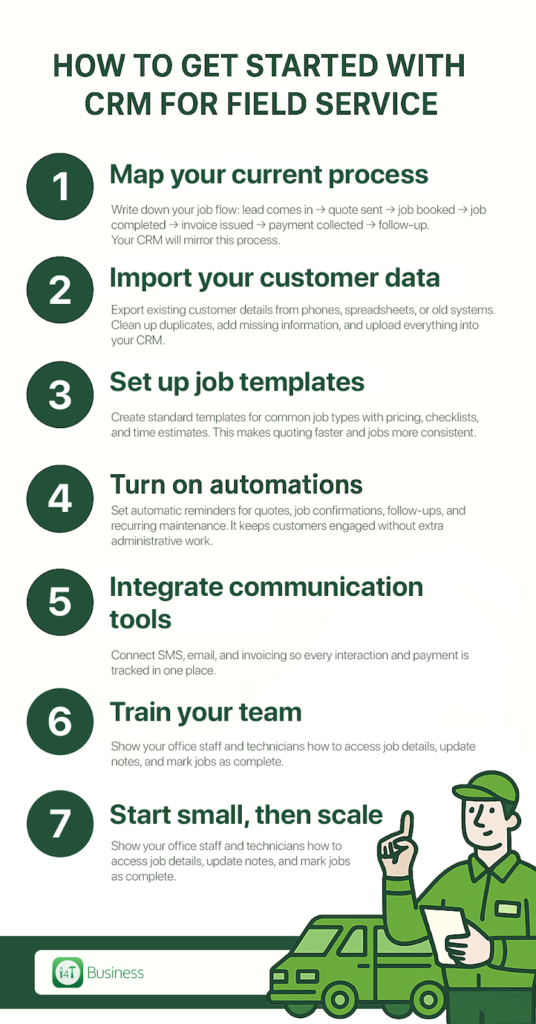Doing quality work alone used to be enough to grow your business in the earlier days. You showed up, fixed the issue, and left the customer happy. But that’s not the game anymore.
These days, customers expect faster updates, smoother communication, and a more professional experience from start to finish. They want reminders before the appointment. They want to know who’s showing up and when. And they want to feel like more than just another job on your calendar.
Here’s the kicker: most tradies don’t lose business because of poor workmanship. They lose it because they forget to interact with the client and follow up after completing the job. We know that, as a field service technician or a businessperson, your schedule is packed with more critical tasks than following up with an old client. Therefore, you either forget or have no time to interact with the clients after completing the job.
That’s where a customer relationship management system for field service comes in handy. It helps you stay organised, respond faster, and keep your clients in the loop without chasing them manually.
The evolution of CRM
There was a time when Customer Relationship Management meant flipping through a Rolodex, jotting notes on paper, and relying on memory to manage client relationships. Then came spreadsheets, which are still manual, still messy, but a step toward something better.
As businesses grew and customer expectations shifted, these old systems started showing cracks. Missed follow-ups. Lost quotes. Jobs slipping through the gaps.
That’s when cloud-based CRM tools changed the game. Now, customer data could live in one place, accessible from the office, the van, or on-site. For field service businesses, it was a leap forward.
Today, we’ve taken another leap into AI-powered CRM. And this isn’t just about storing contact information anymore.
Modern customer relationship management for field service helps you act. It sends reminders before you forget. It nudges customers with follow-ups. It syncs with your email, phone, SMS, and even chatbots, so every job is seamless, timely, and professional.
This will remove the daily chaos that you will face, so you can focus on delivering a great service without chasing paperwork. The future of field service isn’t just on the tools you carry, it’s in how you manage the people you serve
Why traditional methods are holding you back
At the very beginning, you don’t think you need a solid system. You’re handling a few jobs a week, so jotting down customer details in a notebook, maybe logging quotes in Excel, and saving appointments in your phone calendar seems enough. It works, until it doesn’t.
Then, one day, your jobs and operations will pile up. You missed a follow-up. A customer calls, wondering why no one showed up. You double-book a technician. Suddenly, the cracks in your system will start to show.
Traditional methods like manual logs, sticky notes, and spreadsheets aren’t built for the speed and complexity of today’s field service work. They can’t keep up with last-minute reschedules, urgent call-outs, or customers expecting real-time updates and digital invoices.
That’s where Customer Relationship Management for Field Service steps in. CRM replaces the scattered tools with one streamlined platform. It automates what used to slow you down, like job confirmations, reminders, and follow-ups. Further, it gives your entire team instant visibility into every customer you are handling, every job, and every invoice.
What a good CRM actually does for field service professionals
A lot of tradies hear “CRM” and think it’s just a digital address book. But a purpose-built Customer Relationship Management system for Field Service is so much more than storing names and numbers.
It’s the system that acts behind the scenes to keep your business running smoothly, especially when the jobs pile up and the pressure’s on. Here’s what a solid CRM actually does for you:
Centralises every customer detail
From job history to special instructions to unpaid invoices, everything tied to that customer is stored in a single location. Therefore, you don’t have to dig through old emails or call the office to get information.
Automates reminders and follow-ups
Do you need to send a quote reminder three days after a site visit? Or do you want to schedule a follow-up with a client who needs maintenance services after six months? With modern CRM software, you can set it all up once and let the software handle the rest.
Synchronise with jobs, scheduling, and invoicing
A proper CRM software integrates easily with other platforms. Modern software will connect with your job calendar, technician assignments, quote builder, and invoicing tools, so nothing slips through the cracks.
Gives technicians on-the-go access
Your crew can pull up customer information, job notes, or past visits right from their phones. That means fewer calls to the office, faster service, and fewer mistakes.
Keeps you looking professional
Branded quotes. Timely responses. Accurate records. It all adds up to an experience that builds trust and keeps customers coming back to you.
What CRM really delivers for field service businesses
If you think CRM is just a fancy contact list, you’re missing the point. A smart customer relationship management system for field service helps you manage jobs more efficiently, keep customers satisfied, and prevent revenue loss. Here’s what it actually does for your business:
Save time on administrative work
You don’t have to spend hours dealing with paperwork or handling every administrative task manually. CRM keeps everything in one place, so you can spend more time completing the job in the field and not in the office dealing with paperwork.
Get more repeat work
It remembers when to follow up, when to check in, and when it’s time to rebook a job. You don’t need to remember every past customer; your CRM already does.
Speed up your workflow
Send quotes, book jobs, and issue invoices fast in one single platform. You don’t have to jump between multiple systems or chase down details.
Look more professional
Better quotes. On-time reminders. Smooth updates. Customers notice when you’re on the ball, and they tell their friends and family about your business. This is how small businesses build big reputations.
Grow your business
Whether you’re running solo or managing a team, CRM helps you scale. You can track every job, payment, and customer without the extra effort.
Why CRM should be built into your field service management software
Running your CRM separately from your job management tools might work when you have only a few customers. But as your business grows, it becomes more challenging. You will have to deal with missed follow-ups, double-booked jobs, delayed invoices and even frustrated customers.
That’s why an all-in-one Field Service Management platform with a built-in CRM should be your ideal choice. Instead of using multiple systems, you can manage your entire workflow from one place:
- Job details and customer records together: Every quote, job note, and invoice stays linked to the right customer automatically. No data is scattered across different applications.
- Consistent customer communication: Email confirmations, SMS reminders, and phone call logs will synchronise with the job record so the whole team can stay on the same page.
- Real-time job updates: Technicians can access customer history, upload notes or photos, and mark jobs complete from the field. These updates can be viewed instantly by the office team.
- Faster invoicing and payments: When a job is finished, you can do the invoices with one click, and payment records will synchronise automatically to the customer file.
- No missed follow-ups: Automated reminders make sure you stay top of mind for repeat work, maintenance calls, and seasonal service checks.
How to get started with CRM for field service

Switching to a Customer Relationship Management system for Field Service doesn’t have to be complicated. The key is to set it up properly so it works for you from day one. Here’s a clear, step-by-step way to get started:
1. Map your current process
Write down your job flow: lead comes in → quote sent → job booked → job completed → invoice issued → payment collected → follow-up. Your CRM will mirror this process.
2. Import your customer data
Export existing customer details from phones, spreadsheets, or old systems. Clean up duplicates, add missing information, and upload everything into your CRM.
3. Set up job templates
Create standard templates for common job types with pricing, checklists, and time estimates. This makes quoting faster and jobs more consistent.
4. Turn on automations
Set automatic reminders for quotes, job confirmations, follow-ups, and recurring maintenance. It keeps customers engaged without extra administrative work.
5. Integrate communication tools
Connect SMS, email, and invoicing so every interaction and payment is tracked in one place.
6. Train your team
Show your office staff and technicians how to access job details, update notes, and mark jobs as complete.
7. Start small, then scale
Test the system with a few jobs or one crew for a week. Adjust templates, reminders, and workflows before rolling it out fully.
Ready to take control of your field service business?
At the end of the day, Customer Relationship Management for Field Service isn’t just about tracking customers. It’s about building a business that runs smoothly, keeps customers happy, and wins more repeat customers.
That’s exactly what i4T CRM+ delivers. It combines powerful CRM features with job scheduling, invoicing, and communication tools, all in one platform built for the modern field service industry. No switching between apps. No missed follow-ups. No lost data.
With i4T CRM+, you get better features, automation, and customer insights that you need to grow and avoid challenges that slow so many tradies down.
If you’re ready to work smarter, not harder, it’s time to see what i4T CRM+ can do for you. Start your free trial today and discover how easy it is to manage your entire workflow from one connected platform.
FAQs
No. CRM also manages interactions, automates follow-ups, tracks job history, and improves customer communication in one system.
Not necessarily. Many CRMs integrate with scheduling software or offer built-in scheduling for a seamless workflow.
Yes. Some CRMs let you run email, SMS, and marketing campaigns directly from the platform.
Absolutely. CRM tools scale from single-operator businesses to large service teams easily.
No. Most modern CRMs are designed for ease of use with simple dashboards and automation wizards.
Hot off the press!

With our cutting-edge technology and in-depth knowledge of how the
Field Service Management sector operates, the i4TGlobal Team loves to share industry insights to help streamline your business processes and generate new leads. We are driven by innovation and are passionate about delivering solutions that are transparent, compliant, efficient and safe for all stakeholders and across all touch points.




